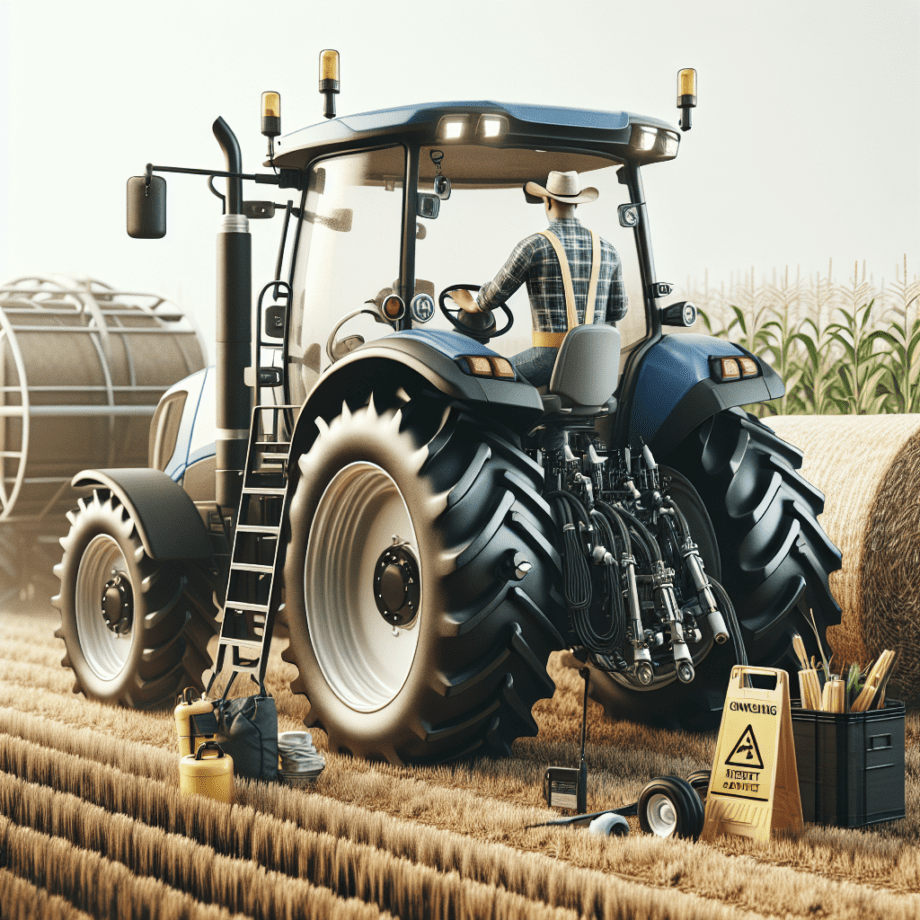Ensuring the safety of farmers while operating tractors is crucial for preventing accidents and injuries. Tractors are indispensable tools in modern agriculture, but their powerful machinery and complex operations can pose significant risks if not handled properly. This article provides essential safety tips that every farmer should know to operate tractors safely and efficiently.
Understanding Tractor Safety Basics
Before diving into specific safety tips, it is important to understand the fundamental principles of tractor safety. Tractors are powerful machines designed to perform a variety of tasks, from plowing fields to transporting heavy loads. However, their size, weight, and mechanical complexity can make them hazardous if not used correctly. Here are some basic safety guidelines to keep in mind:
- Read the Manual: Every tractor comes with an operator’s manual that provides detailed instructions on how to operate the machine safely. Familiarize yourself with the manual and follow the manufacturer’s recommendations.
- Conduct Pre-Operation Checks: Before starting the tractor, perform a thorough inspection to ensure that all components are in good working condition. Check the tires, brakes, lights, and fluid levels.
- Wear Appropriate Clothing: Always wear suitable clothing and protective gear, such as sturdy boots, gloves, and a helmet. Avoid loose clothing that could get caught in moving parts.
- Use Seat Belts: If the tractor is equipped with a seat belt, use it. Seat belts can prevent you from being thrown from the tractor in the event of a rollover.
Safe Operation Practices
Operating a tractor safely requires adherence to specific practices that minimize the risk of accidents. Here are some key tips for safe tractor operation:
Maintain Proper Speed
One of the most important aspects of tractor safety is maintaining a safe speed. Tractors are designed for power, not speed, and operating them too quickly can lead to loss of control. Always drive at a speed that is appropriate for the terrain and the task at hand. Slow down when turning, on slopes, or when operating in confined spaces.
Avoid Overloading
Tractors are often used to transport heavy loads, but overloading can compromise stability and increase the risk of tipping over. Always adhere to the manufacturer’s load capacity guidelines and distribute the weight evenly. Use counterweights if necessary to maintain balance.
Be Cautious on Slopes
Operating a tractor on slopes requires extra caution. Always drive straight up and down slopes rather than across them to reduce the risk of rollover. If you must drive across a slope, go slowly and keep the load low to the ground. Avoid making sharp turns or sudden movements.
Keep a Safe Distance
Maintain a safe distance from other vehicles, people, and obstacles. Tractors have large blind spots, and it can be difficult to see what is around you. Use mirrors and be aware of your surroundings at all times. When working near other people, communicate clearly and use hand signals if necessary.
Regular Maintenance and Inspections
Regular maintenance and inspections are essential for keeping your tractor in safe working condition. Neglecting maintenance can lead to mechanical failures and increase the risk of accidents. Here are some maintenance tips to follow:
Follow a Maintenance Schedule
Adhere to the maintenance schedule provided in the operator’s manual. This includes regular oil changes, filter replacements, and lubrication of moving parts. Keep a record of all maintenance activities to ensure that nothing is overlooked.
Inspect Safety Features
Regularly inspect safety features such as roll-over protective structures (ROPS), seat belts, and lights. Ensure that these features are in good working condition and make any necessary repairs or replacements promptly.
Check Tires and Brakes
Tires and brakes are critical for safe tractor operation. Check the tire pressure regularly and look for signs of wear or damage. Ensure that the brakes are functioning properly and make any necessary adjustments or repairs.
Monitor Fluid Levels
Regularly check the levels of essential fluids, including engine oil, hydraulic fluid, and coolant. Low fluid levels can lead to mechanical failures and increase the risk of accidents. Top up fluids as needed and look for any signs of leaks.
Emergency Preparedness
Being prepared for emergencies is a key aspect of tractor safety. Knowing how to respond in the event of an accident or mechanical failure can prevent injuries and save lives. Here are some tips for emergency preparedness:
Have a First Aid Kit
Keep a well-stocked first aid kit on the tractor or in a nearby location. Ensure that all workers know where the kit is located and how to use its contents. Regularly check the kit and replace any used or expired items.
Know Emergency Procedures
Familiarize yourself with emergency procedures, such as how to shut off the tractor quickly and how to call for help. Ensure that all workers are trained in these procedures and conduct regular drills to reinforce their knowledge.
Carry a Mobile Phone
Always carry a mobile phone or two-way radio when operating a tractor. In the event of an emergency, you can quickly call for assistance. Ensure that the phone or radio is fully charged and has a good signal before starting work.
Stay Calm and Act Quickly
In the event of an emergency, stay calm and act quickly. Follow the emergency procedures you have learned and use your first aid kit if necessary. If you are unable to resolve the situation, call for help immediately.
Conclusion
Tractor safety is a critical aspect of modern farming that should never be overlooked. By understanding the basics of tractor safety, following safe operation practices, maintaining your equipment, and being prepared for emergencies, you can significantly reduce the risk of accidents and injuries. Remember that safety is everyone’s responsibility, and taking the time to implement these tips can make a big difference in ensuring a safe and productive farming environment.
